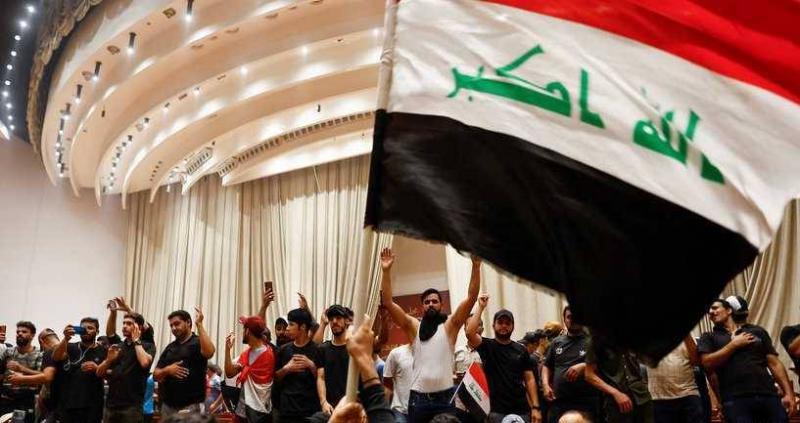The situation in Iraq is heading towards further fragmentation and chaos, making it difficult to predict the country’s fate, as options range from acute political crises to escalating security situations and a potential slip back into civil war, according to diplomatic sources for "Al-Markaziya." Yesterday, following the Sadrist movement's occupation of the parliament at the end of last week, the "Coordination Framework" called for counter-demonstrations. The "Coordination Framework" stated, "We call upon the Iraqi people to defend the state, its legitimacy, and its institutions, foremost of which are the legislative and judicial authorities, and to confront this deviation from law, customs, and sharia." This escalation from the "Framework" came after the "Sadrist movement" rejected the "Coordination Framework's" nomination of Mohammed Shia' al-Sudani for the presidency of the council of ministers and the government formation.
Sources explain that the crisis began after the "Sadrist movement" emerged as the leading winner in the elections with 73 seats out of 329, alongside its efforts to form a national majority government. In contrast, the "Coordination Framework" insisted on forming a consensus government to secure its continued presence in significant power positions. In response to this stance, Muqtada al-Sadr, the leader of the "Sadrist movement," gave the "Coordination Framework" a chance to form a government alone as a challenge to resolve the crisis, which the framework failed to do. Subsequently, the opportunity to form a government was given to independents, but they too did not succeed.
Amid this paralysis, the political horizon in Iraq is entirely blocked, prompting the Sadrist movement to return to the streets. As the opposing factions also mobilized, fears of violent confrontations grew, especially if influential regional and international powers, primarily Iran, decide to exploit the current situation to escalate tensions and incorporate the Iraqi file into the international tussle as an additional pressure point, much like what is happening in Beirut, whether governmentally or territorially, and perhaps also at the presidential level. The situation in Iraq mirrors that of Lebanon.
What is not promising is that the Saudi-Iranian dialogue, which was imminent just a few days ago, has seen a decline in discussions, indicating that Tehran may have decided to hold back from pursuing it, preferring during this period to retain its leverage, notably in Lebanon, Iraq, and Yemen. Can conditions in these countries remain suspended, troubled, and tense until the resumption of regional dialogue or the Vienna negotiations? Or might some internal dialogues, along with the Iraqi President Mustafa al-Kadhimi's initiative, help bring about some de-escalation?




